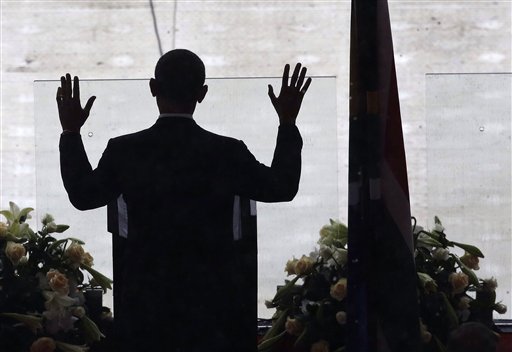President Barack Obama delivered a eulogy to South Africa’s late President Nelson Mandela at First National Bank Stadium in Soweto, Johannesburg on Tuesday, before a large crowd that had gathered in the rain for a memorial together with dozens of heads of state from around the world. The president’s address was devoted to Mandela’s life and example. However, as in most Obama addresses, he could not resist talking about himself.
“For the people of South Africa, for those he inspired around the globe–Madiba’s passing is rightly a time of mourning, and a time to celebrate his heroic life,” President Obama said in remarks prepared for delivery. But I believe it should also prompt in each of us a time for self-reflection. With honesty, regardless of our station or circumstance, we must ask: how well have I applied his lessons in my own life? It is a question I ask myself–as a man and as a President.”
“Over thirty years ago, while still a student,” he said later in his address, “I learned of Mandela and the struggles in this land. It stirred something in me. It woke me up to my responsibilities–to others, and to myself–and set me on an improbable journey that finds me here today. And while I will always fall short of Madiba’s example, he makes me want to be better.”
President Obama turned some of his self-reflections into a political message, reinforcing his recent campaign against inequality–and launching veiled attacks at his opponents at home (emphasis added):
We know that like South Africa, the United States had to overcome centuries of racial subjugation. As was true here, it took the sacrifice of countless people–known and unknown–to see the dawn of a new day. Michelle and I are the beneficiaries of that struggle. But in America and South Africa, and countries around the globe, we cannot allow our progress to cloud the fact that our work is not done…..There are too many of us who happily embrace Madiba’s legacy of racial reconciliation, but passionately resist even modest reforms that would challenge chronic poverty and growing inequality.
The President touched on some of the more important elements of Mandela’s legacy, noting that while the South African leader was determined to defend his “core principles,” Mandela “was not afraid to compromise for the sake of a larger goal.” It is a balance that President Obama has struggled to achieve in his dealings with the political opposition at home, to the frustration of both his supporters and his critics.

COMMENTS
Please let us know if you're having issues with commenting.